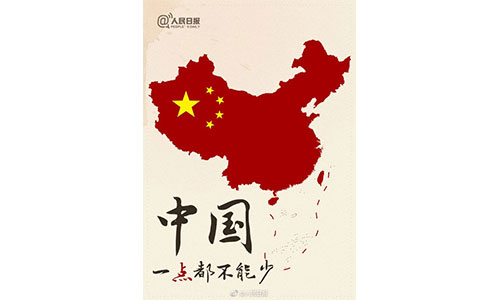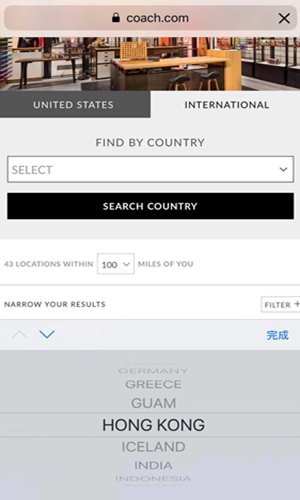HOME >> CHINA,SPECIAL-COVERAGE
Coach brand risks potential boycott
By Song Lin and Yang Kunyi Source:Global Times Published: 2019/8/12 22:53:40
Foreign firms warned for wrong HK, Taiwan reference

A map of China with caption reading "China without any part left out" Photo: People's Daily Sina Weibo account
US fashion brand Coach has sparked online outrage on Chinese social media after it was found to list Hong Kong and Taiwan as "countries" on its products and website on Monday. The incident triggered a series of fashion companies to apologize for similar mistakes, including French luxury brand Givenchy, US brand Calvin Klein and Japanese sports brand Asics.Chinese model Liu Wen, a current brand ambassador of Coach, severed her ties with the brand. Celebrity Yi Yangqianxi (also known Jackson Yee) later also announced he was ending his association with Givenchy.
Coach's behavior has had a serious impact on Chinese sentiment, and its behavior should be severely condemned, Liu Wen said in a statement on Sina Weibo.
The products in question are T-shirts from the Coach 1941 series, featuring a list of countries and their cities on their reverse side, including "Chicago, United States" and "Milan, Italy."
Four cities in China are on the list. But while Shanghai and Beijing are listed under China, Taipei is listed as "Taipei, Taiwan," in a manner that separates the island of Taiwan from China. The Hong Kong Special Administrative Region is listed separately as "Hong Kong," with no country name.

A screenshot of Coach website that lists Hong Kong as a country Photo: a screen shot of Coach official website
Such disrespect for China's territorial integrity is also clear on Coach's website, where it was found to list Hong Kong and Taiwan as independent countries under its "search country" option. The website later added China after Hong Kong and Taiwan.The pictures of the T-shirts and website screenshots have been circulating on Chinese social media, and netizens expressing outrage toward the brand. "Coach" has become a top-trending hashtag on China's Twitter-like Weibo.
Later that day, netizens also discovered similar mistakes of Givenchy and Asics, which also apologized online later.
"China's territorial integrity and sovereignty is a solid red line which can never be crossed by any country or company," Yang Qingshan, an expert at the luxury research center of the University of International Business and Economics, told the Global Times on Monday.
"It's not that they don't know, they are blatantly challenging China's bottom line," a netizen on Weibo said.
Coach, Givenchy and Asics are not the first group of brands embroiled in controversy this week for mislabeling Chinese cities as countries. On Sunday, Italian fashion brand Versace apologized for a similar range of clothes with design which implied Hong Kong and Macao were separate countries, saying it was a mistake in their design and the offending clothing would be "destroyed."
Versace's brand ambassador in China, Yang Mi, said she would terminate her ties with the brand.
Another Italian brand, Dolce & Gabbana, is still suffering from the aftermath of a racist video that insulted China last November. Chinese people did not accept the brand's apology, Bloomberg reported. The brand was removed from online retailers in China, such as Alibaba's Tmall and JD.com, after the event.
Products or marketing strategies of these world-renowned fashion brands were all taken out after careful consideration and reflect the companies' values, Yang said, adding that if these had political motives, Chinese consumers would boycott them.
The People's Daily on Monday said in a brief commentary that companies operating in China should abide by Chinese laws. These "coincidental" mistakes, especially during the current "sensitive moment," when Hong Kong is being assaulted by secessionists, are even more egregious, and will only dim the prospects of their brand prestige in the Chinese market.
"Hong Kong and Taiwan are China's territories. If a foreign company doesn't know this, it should get out of China," a Beijing-based consumer told the Global Times on Monday.